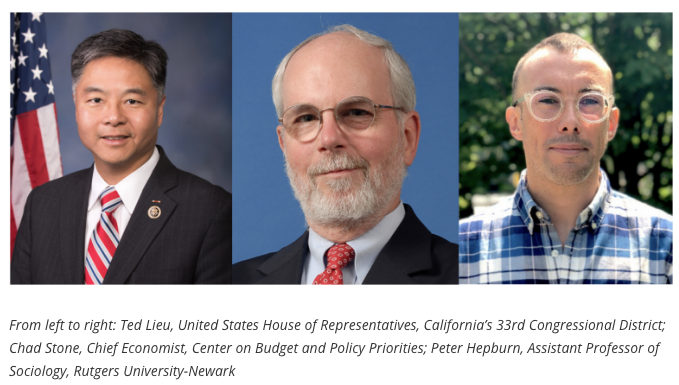Vidya Sethuraman
India Post News Service
Speakers at the EMS conference held on Dec 22 focused on the bleak prospects for economic recovery this winter amid the COVID-19 pandemic, unemployment crisis; expiring eviction moratoriums which threaten to render millions of U.S. residents homeless; and the limits of the Congressional relief package. Meanwhile, other unemployment provisions are set to expire this month, which could leave 12 million Americans without jobless benefits. Protections for renters and student loan borrowers are also set to run out.
Rep. Ted. Lieu, D-California – Congressman Lieu discussed the federal relief bill. Lawmakers struck a roughly $908 billion COVID-19 stimulus deal that includes another round of stimulus checks and badly needed jobless benefits for struggling Americans, ending a long standoff in Washington with one of the biggest rescue bills in U.S. history.
 The deal includes restarting a $300 boost to the federal unemployment insurance benefit, extending eviction moratoriums for renters by a month and a $600 direct payment to most Americans, according to the 5,600 page text of the bill. “The COVID relief package is much smaller than I would have preferred. But at the same time, it’s better than nothing and that is why I voted for it,” said Rep. Ted Lieu. “This is not an insignificant bill. I just don’t think is a big enough to address a scale of this pandemic,” said Lieu.
The deal includes restarting a $300 boost to the federal unemployment insurance benefit, extending eviction moratoriums for renters by a month and a $600 direct payment to most Americans, according to the 5,600 page text of the bill. “The COVID relief package is much smaller than I would have preferred. But at the same time, it’s better than nothing and that is why I voted for it,” said Rep. Ted Lieu. “This is not an insignificant bill. I just don’t think is a big enough to address a scale of this pandemic,” said Lieu.
Chad Stone, Chief Economist at the Center on Budget and Policy Priorities discussed the unemployment crisis, and racial and ethnic disparities in sustainable employment. He also discussed expiring unemployment insurance benefits for workers who have been unemployed for more than 26 weeks.
The number of Americans who’ve been unemployed for more than 26 weeks—the maximum duration of regular state unemployment benefits in most states—has climbed from 1.1 million people in February, pre-pandemic, to 3.9 million in November. Nearly four in 10 workers collecting unemployment benefits last month have been filing claims for at least 27 weeks, according to the Labor Department.
Chad Stone notes that two-thirds of the Labor Department’s reported number of unemployment insurance recipients are now in temporary programs that were created by the CARES Act in March and that expire just after Christmas. Significantly, mixed status families, with undocumented immigrants living alongside U.S. residents, will get relief checks in this round and can also apply for back-benefits from the previous round of $1,200 checks, said Chad Stone, chief economist at the Center for Budget and Policy Priorities, speaking at the EMS briefing. Undocumented immigrants, however, are still ineligible for the relief checks.
Peter Hepburn, Assistant Professor of Sociology, Rutgers University-Newark Professor Hepburn leads the Eviction Lab’s analysis of pandemic evictions. . He discussed looming evictions and impact of moratorium. The Eviction Lab at Princeton University estimates there have been more than 150,000 evictions during the pandemic in the 27 cities it tracks. Public health experts support federal and state bans on evictions as a tool to reduce COVID-19 cases and deaths.
Many renters remain worried, because once the CDC moratorium is lifted; landlords can collect back rent owed plus interest from tenants. Peter said $25 billion would go a long way towards helping renters survive evictions this winter, though he would have preferred to see $30 billion. He advocated for direct funding to tenants to sidestep the issue of landlords who don’t want to participate in the program because it limits their ability to evict tenants. The researchers are calling for a comprehensive strategy that includes moratoriums on evictions, rent relief assistance, and housing assistance. The National Low-Income Housing Center has estimated a need of at least $100 billion in emergency rental assistance.






